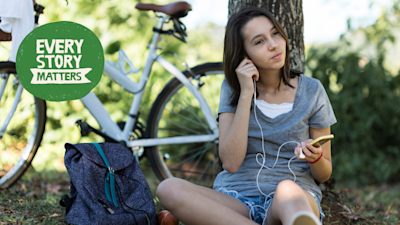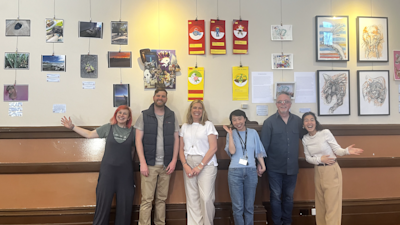"I've got a lot more confidence in myself, and I know that I'm not going to go backwards."
Trigger warning: Sharran’s story talks about mental health and end of life. Sometimes words or images can cause sadness or distress, or trigger traumatic memories for people, particularly survivors of past abuse, violence or childhood trauma. For some people, these responses can be overwhelming. If you need to talk to someone, support is available.
Sharran lives with ill health, including mental health related conditions, which created barriers in her everyday life. With assistance from Life Without Barriers Non-Acute Psychosocial Support program (NAPS), Sharran found the support she needed to build her capacity and resilience.
When we recently sat down with Sharran and Heidi, her Community Rehabilitation Support Worker, Sharran generously shared her lived experience with courage and humility.
"I don't have a lot of capacity in my lungs and my hands aren't working properly. I need help to do all my housework and to prepare meals. My garden is very huge, and there's no way I can afford to do that by myself," said Sharran.
"My ill health affects my brain language. It keeps telling me that I don't want to be here and sends me negative messages."
"I've just got to knock them back and say 'No, you can keep going'."
Sharran found the support she needed when she connected with Life Without Barriers Non-Acute Psychosocial Support program. The NAPS program provides recovery orientated rehabilitation and support services for people living with mental illness aged 16 to 64 years and is aimed at supporting people with mental health conditions who require non-acute psychosocial support to enhance mental wellbeing, improve their level of functioning, and establish longer term community connections.
"To start off, I was very overwhelmed, and I didn't know how to deal with anything really. With the Mental Health team and Life Without Barriers coming to help, it started everything moving," said Sharran.

Image: Sharran and Heidi sit on a couch in Sharran's lounge room, smiliing at the camera.
"I'm going to do some hydro swimming to try and get keep the mobility up and not get stiffer," said Sharran.
Heidi said that the hard work is paying off and that the changes she has seen in Sharran have been amazing.
"Before we did not dare to dream about hydro swimming," said Heidi.
"It's amazing to have found alternatives and for Sharran to have the stamina to say, 'Yes, I want that'."
Sharran believes it is important to share her story and lived experience to help others know they are not alone and that it can get better.
"I didn't really think that I was anything or that I did matter. But, as I go along, I know that my response and my story does matter for people to see, because that shows that there is life beyond the bad points," reflected Sharran.
"I couldn't deal with day-to-day stuff. But now I can. I've got a lot more confidence in myself, and I know that I'm not going to go backwards mental or health wise."
"I have to look after my health for my children and family and that's a good thing for me to keep going for, and know that I have a lovely support worker, Heidi, and Life Without Barriers there to help."
Non-Acute Psychosocial Support
Provided one-on-one in a person’s home and local community, Non-Acute Psychosocial Support (NAPS) is aimed at supporting people with mental health conditions, aged 16 to 64, who require non-acute psychosocial support to enhance mental wellbeing, improve their level of functioning, and establish longer term community connections.
NAPS is delivered from a Recovery Oriented Practise, meaning that an individual is the expert in their life, and we support and coach them to find strategies that work to meet their goals.
Learn more about Non-Acute Psychosocial Support and our Mental Health Services in South Australia.


